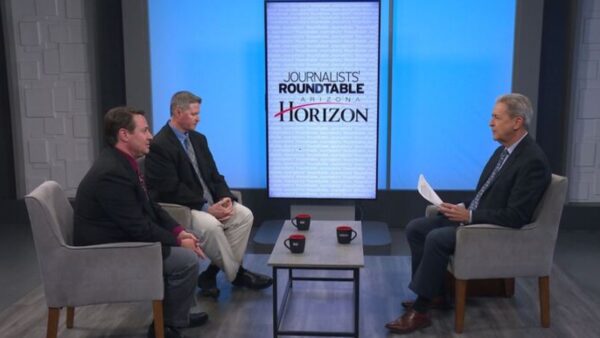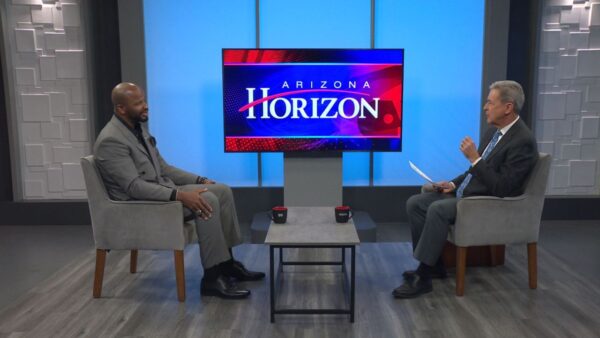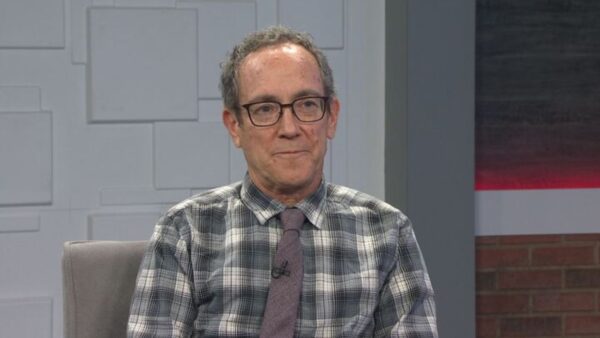See how one budding artist used crowdfunding to help her buy art supplies. That will be followed by a discussion on how crowdfunding works and how it can be used to help reach goals for businesses and individuals. Mary Juetten, a national crowdfunding expert and founder of Traklight, a Phoenix company that has developed a software platform to identify and protect intellectual property, will tell us more about crowdfunding.
Ted Simons: Technology is changing how we connect with others. We'll hear from a crowd funding expert in a moment but first we see how a single post to a website has changed one Phoenix family.
Lynn Baldwin: Melinda is 21 years old. She was born a little bit of a late start.
Christina Estes: It took seven years for Lynn Baldwin to learn her children had a disorder caused by a chromosome defect. It took 14 years for her to discover her daughter's talent.
Lynn Baldwin: She first started by accident.
Christina Estes: It started when Lynn asked Melinda to paint for grandma.
Lynn Baldwin: She said I would love to keep it for myself, and I will do another one for grandma, and I thought ok, great idea. So, she started to do another one. Of course, the other one she also liked.
Christina Estes: And another and another. In six weeks, she has created a dozen pieces. But they are not just covering the family's tables and walls. She is now painting for people that she has never met. Strangers who have invested in her.
Lynn Baldwin: It's just beautiful.
Christina Estes: When her mother realized the power of painting, she turned to a crowd sourcing site to gather donations for supplies.
Lynn Baldwin: I'm very thankful for their help. People are -- have a very good heart.
Christina Estes: The goodness comes from across the U.S., Massachusetts, Illinois, and Arizona. Lynn hoped to collect $200. She got more than $300.
Lynn Baldwin: Her mind goes everywhere. I mean, I can't see what's in her head, so through her painting, I can understand a little bit about her. Someday, she has orange, red, and very happy color. And then the other times, she has blues, greens, you know, more like a deep sea color. So, it's the reflex in her mind.
Christina Estes: When she paints, she says she goes with what she is thinking always fast, always joyful. In exchange for their support, Melinda's backers get colorful thank you cards, canvas paintings, and a mother's eternal gratitude.
Lynn Baldwin: She's a lot happier after painting. It gave her meaning for her life.
Ted Simons: Her mother is now considering creating a permanent website where people can view and purchase her paintings. To learn more about crowd funding, we spoke with Mary Juetten, with Traklight, who has developed a platform to identify and protect intellectual property. Thank you very much for joining us tonight.
Mary Juetten: Thank you.
Ted Simons: For me, at least, this is a bit confusing here. We have crowd sourcing and funding, equity crowd funding, rewards-based crowd funding. What did we just see with this family? What was that -- is that crowd -- is that rewards-based?
Mary Juetten: Yes. Ted, that's rewards-based crowd funding. The origin of crowd funding, or going out to find your crowd and find a source of money, is donations, but this is one step further because the people were donating the $300 that they collected, the donors, instead of just receiving, you know, the good feeling that comes along with the donation, they are getting perks or rewards. Those were the paintings or the thank you cards.
Ted Simons: That's the rewards-based. Let's get to equity crowd funding. This could be big news for startups, entrepreneurs, define that for us.
Mary Juetten: So, equity crowd funding on the Federal level came out of the jobs act, which is the jumpstart our business startups act was -- signed into law in April of 2012. And the idea is that instead of having to be an accredited investor such as experts from Bittrader, which means you have to have certain net worth or level of income, anybody can invest and buy a piece of a company by going online and using a crowd funding portal.
Ted Simons: So if I have got Ted's hamburgers and I'm looking for equity crowd funding, you could donate $5 to Ted's hamburgers, and I have to keep track of the donation and you get returns on that? How does that work?
Mary Juetten: Actually, so if you had Ted's Hamburgers, and you would go to a funding portal, and the reason I am saying you would go is because it's not yet legal in the U.S. to do this equity crowd funding, but I would go, and I would say hey, I want to be an investor in Ted's hamburgers, and if I could buy one chair for, let's say, $5, which would be a great deal, I could then purchase that $5 share, and you would have to keep track of everybody who invested, so it's not really a donation. You are, actually, investing like on the stock market.
Ted Simons: You are just not, as it stands, quote/unquote accredited?
Mary Juetten: Correct. So, it is for anyone -- you have to have a certain amount of income. There is rules about how much you can invest. For example, 5%, if you make under $100,000, so that would limit you to say 5,000 a year of investments. But, it opens up a huge source of funding for small businesses, and startups.
Ted Simons: So, and before we go on now, you said this was not legal yet. I thought it passed in 2012. What's going on?
Mary Juetten: So, it passed into law, and then the SEC was the -- the securities exchange commission was tasked with coming up with the rules for this. So, they created rules that came out last October. They were a tad late, nine months late. It's a big job, and they came out with these rules, and they open it up for comment, and comments were received until early 2014, but the SEC hasn't released the rules that they may or may not have changed based on the comments. So, although there are some states that have crowd funding, there is no federal crowd funding allowed.
Ted Simons: And the idea, because I guess we look on both sides here, if I have got Ted's hamburgers and I want to make sure that I am doing the special thing, someone doesn't run off with and open a chain, that's my intellectual property, that needs to be protected to some degree, correct?
Mary Juetten: Correct. Whether it's rewards-based crowd funding, equity-based crowd funding or, frankly, raising, if you are going to angel investors, raising crowd funding, you might have the secret recipe for your hamburgers, so that's nothing that you are going to patent, nothing that, you know, there is no protection for that. So you have to keep your secret sauce literally secret. So, let's say that you had something like your name, Ted's hamburgers and you wanted to protect, all these things have to be identified and protected before you go out publicly. So, somebody doesn't steal your idea once it is out there.
Ted Simons: Ok. Let's go to the other side of the fence, where I am just as big with Ted's hamburgers, and I am going to dump a bunch of money if there and tomorrow we say thank you very much, I'm gone, out of here with your money. How do you protect investors?
Mary Juetten: And that is a big concern, and the jobs act has a lot of information around education for investors. When a company goes out to raise money, currently, that's not raising money on the stock exchange, they creating something, a private placement memo, which lists all kinds of risks. So, part of what the SEC rules came out with is the same kind of disclosure or information has to be provided when I would be making my investment in Ted's hamburgers, you would have made available to me as the investor a whole raft of information, including risks that you might go out of business, and investing in private companies is risky business.
Ted Simons: It is. Especially the private company is a little on the shady side.
Mary Juetten: However, and there's been lots of people who talked about it, and the difference between, you know, somebody is on the shady side, you have to comply with background checks. You have to comply with a lot of regulations. You have to provide financial statements. You have to provide a lot of information, so there is a lot of rules around it to try to prevent any kind of fraud.
Ted Simons: We don't have too much time left, but I keep hearing of indigogo and kick starter.
Mary Juetten: Those are the rewards-based platforms at this time. So, there you can go and list your project or your film or whatever your cause or whatever you are doing, you list it there, and then you offer a series of rewards. So, for example, if you are doing something around a movie, you might have get your name in the credits or a hat that has the movie logo on it or something like that. And that's how people gather money. There is no ownership there.
Ted Simons: So in other words, if you give me 5,000 for my film, about hamburgers, and it winds up -- and I give you a hat or a burger patty, and it winds up making millions of dollars, you don't get any of those.
Mary Juetten: No, because our deal was I'm supporting you, I am getting my hat, and you are gathering the money you need to make your project successful.
Ted Simons: Is this the future? We are talking about Arizona's future in this entire series. Could this be the future of startups?
Mary Juetten: I think that both the rewards-based and the equity-based is the future of the way for startups to get started. There was a lot of pushback around the equity saying you know, people don't want to use this to raise a million dollars. Well, startups, if it's not a huge idea where you are going to need millions, you could get started with a very small amount of money. If you go to the right crowd, which is your Arizona ecosystem, to raise that money, we can end up creating more jobs in Arizona. So, it would be great. There is about 12 or 13 states now, who have their own intrastate crowd funding laws, and I would think it would be great if Arizona would do that.
Ted Simons: Is that in the works, do you think?
Mary Juetten: I have not heard that it's in the works, but I would love to hear about it.
Ted Simons: Before you go now, you are with Traklight. What is Traklight?
Mary Juetten: So I founded Traklight when I was in law school here at Arizona State in 2010 because I saw that entrepreneurs were losing their intellectual property, and intangibles of intellectual property are 80% to 90% of the value of companies these days, particularly startups. And we created a software platform that allows entrepreneurs very affordably to identify the intellectual property that they need to protect. So, that's what we created, and we're a proud Arizona company.
Ted Simons: I would say that you are rooting for crowd sourcing and funding to increase, as well?
Mary Juetten: It would be great for us, but, you know, like we tell everyone, 100% of companies have I.P., and even Ted's hamburgers has I.P., so regardless of what -- how you are raising your money, you still need to identify the -- the bank wants to know that you have the I.P.
Ted Simons: I bet it does. And well, very interesting. It does sound like -- it's fascinating, and it makes you want to do something and get a bunch more behind you.
Mary Juetten: Go log on to indigogo.
Ted Simons: Thanks for joining us.
Mary Juetten: Thank you.
Ted Simons: And that is it for now. I'm Ted Simons. Thank you very much for joining us on this special Arizona's future edition of Arizona Horizon. You have a great evening.
Mary Juetten:National CrowdFunding Expert and Founder, Traklight;




















